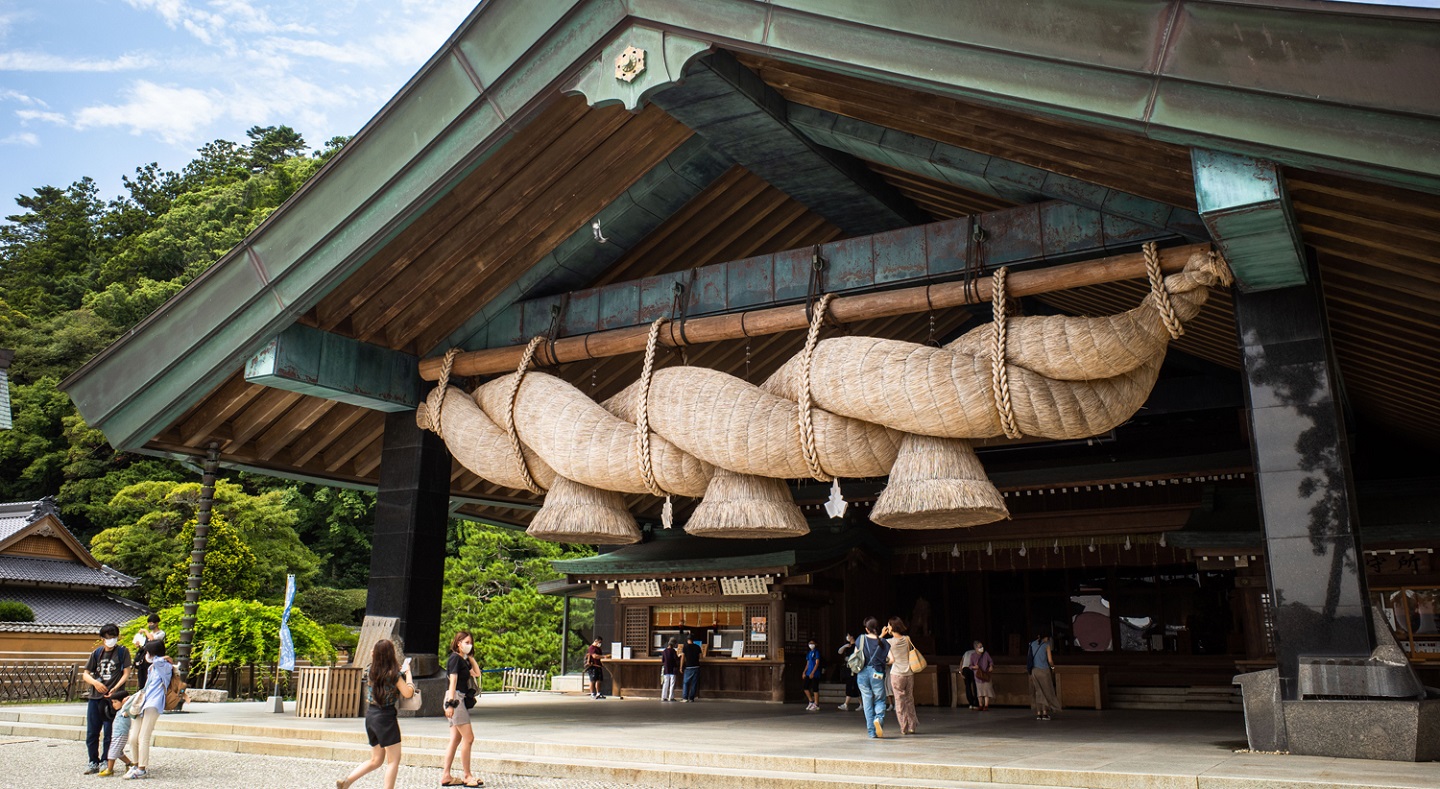Photo: Izumo Taisha “Kagura Hall”
Table of Contents
– Overview of Izumo Taisha Shrine
– Faith and Origins of Izumo Taisha
– The Myth of “The White Rabbit of Inaba”
– Prayer Method for Being Blessed with Good Connections
– Recommended Tours Including Izumo Taisha
Overview of Izumo Taisha Shrine
Known as the gathering place of Japan’s deities, Izumo Taisha has been an object of people’s faith since ancient times. Located in Izumo City, Shimane Prefecture, it is one of Japan’s oldest shrines. Its history is ancient, with its name recorded in Japan’s oldest historical texts, the “Kojiki” and “Nihon Shoki.” The principal deity is Okuninushi-no-Okami, known as the god of matchmaking, and many visitors come to pray for good relationships.
The main highlight is the magnificent shrine buildings. The Main Hall (National Treasure) still boasts the tallest shrine architecture in Japan, though it is said to have been about twice its current height at 48 meters during the Heian period. The largest shimenawa (sacred rope) in Japan hangs at the front of the Kagura Hall, and its size and beauty are overwhelming. Additionally, many shops line the approach, where you can purchase local specialties and souvenirs.
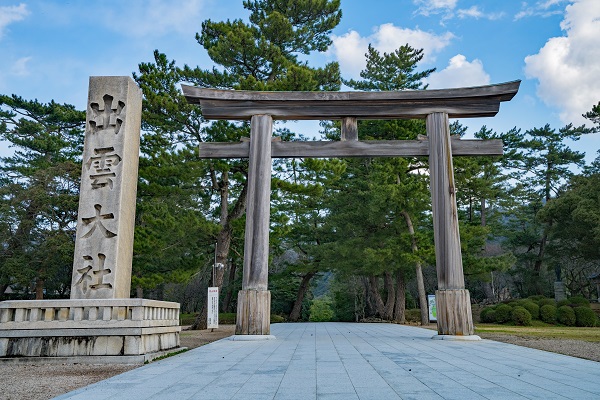
The greatest charm of Izumo Taisha is undoubtedly its mystical atmosphere. The nature surrounding the shrine and the Main Hall standing quietly within it provide peace and healing to visitors.
Every year during the 10th month of the lunar calendar, eight million deities from all over Japan gather in Izumo. Nationally, this month is called “Kannazuki” (month without gods), but in Izumo, where the gods gather, it is called “Kamiarizuki” (month with gods).
Izumo Taisha offers a sacred space that draws visitors in and makes them want to return again and again. Please visit this land where a solemn atmosphere pervades the grounds backed by Mount Yakumo, and beautiful seasonal landscapes spread around the shrine.
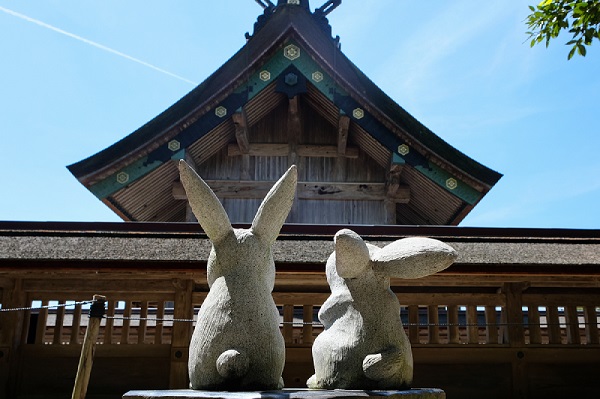
Access
〒699-0701
195 Kizukihigashi, Taisha-cho, Izumo City, Shimane Prefecture
About 25 minutes by bus from JR Izumo-shi Station
Faith and Origins of Izumo Taisha
About Okuninushi-no-Omikami
– The principal deity of Izumo Taisha, affectionately known as “Daikoku-sama”
– Worshipped throughout Japan and honored by many divine names
The Great Work of Nation-Building
– In ancient times, Okuninushi-no-Omikami cultivated the land together with the people, bestowing essential knowledge for daily life including agriculture, fishing, and medicine
– Currently famous as the deity of “matchmaking,” but this “connection” means not only romantic bonds but the precious ties that allow all living beings to flourish together
Origins of Izumo Taisha
Okuninushi-no-Omikami transferred the “Land of Abundant Reed Plains and Rice” that he had built to Amaterasu-Omikami. Amaterasu-Omikami was greatly pleased and grateful, entrusting Okuninushi-no-Omikami with governing the invisible spiritual world. By Amaterasu-Omikami’s command, the deities of Takamagahara built a magnificent palace at the foot of Mount Uka for Okuninushi-no-Omikami. This palace was called “Amenohisumi-no-miya” and became the present-day “Izumo Taisha.”
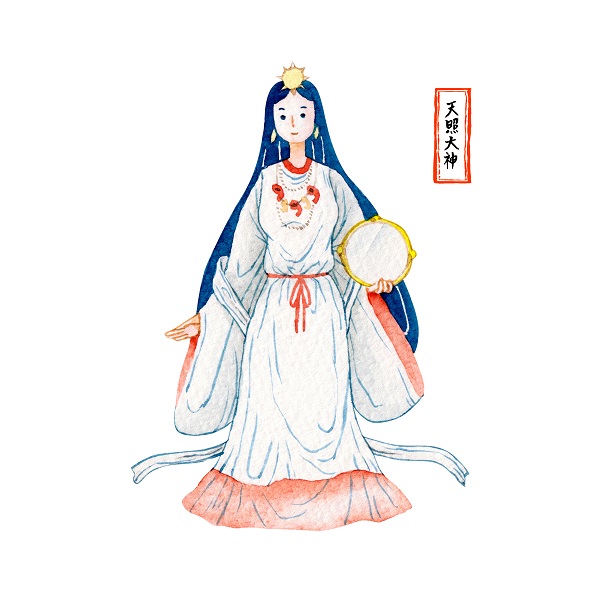
Faith Continuing to the Present
Okuninushi-no-Omikami remains eternally enshrined in this land, showering compassionate love for people’s happiness, and continues to receive deep faith to this day.
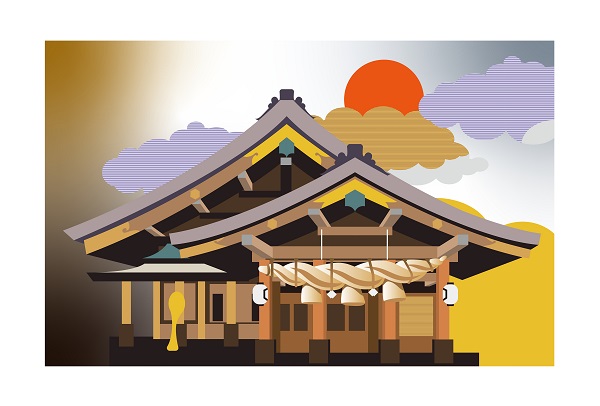
The Myth of “The White Rabbit of Inaba”

Long ago, there lived a kind-hearted deity called Daikoku-sama (Okuninushi-no-Okami) in the land of Izumo. While traveling with his divine brothers to meet a beautiful princess (Yakami-hime) in the land of Inaba, he encountered a crying rabbit whose skin had been stripped away.
The rabbit had tried to cross from Oki Island to the mainland by tricking crocodiles into letting him walk across their backs, but he got carried away and revealed his deception, causing the angry crocodiles to strip off his skin.
The divine brothers who had passed earlier played a cruel trick, falsely telling the rabbit that “soaking in seawater and drying in the wind would help,” which only made the rabbit’s wounds worse.
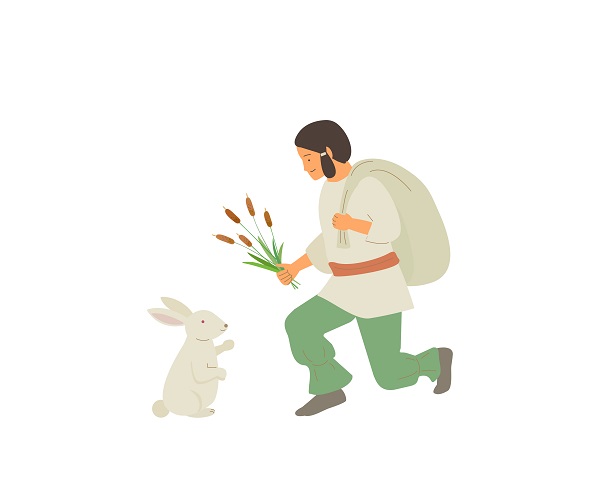
When Daikoku-sama heard the rabbit’s story, he taught the correct treatment: “Wash your body with fresh water and rest on cattail flowers.” When the rabbit followed this advice, his fur grew back and he returned to being a white rabbit.
Although Daikoku-sama arrived at the country much later, Yakami-hime chose Daikoku-sama.
Prayer Method for Being Blessed with Good Connections
Not limited to romantic relationships, we’ll teach you the prayer method for being blessed with good connections of all kinds. Please try visiting with this method. May you all be blessed with wonderful connections.

1. Receive sand at Inasa Beach
This is a sacred place where deities from all over Japan gather. Please take a small amount of sand in a plastic bag or similar. This location is also famous as a photo spot.
2. Pass through the torii gate of Izumo Taisha and enter the approach
The torii gate serves as a barrier between the secular world and the sacred realm. Bow once before passing through the torii and walk straight along the approach. Try to walk along the sides rather than the center.
3. Purify impurities at Harae-no-yashiro
Visit Harae-no-yashiro, which you’ll see on the right side after walking a bit along the approach. Perform “2 bows, 4 claps, 1 bow.”
4. Purify hands and mouth at the purification fountain
Before entering the sacred area, purify your hands and mouth. Pour water on your right hand, then your left hand, and finally receive water in your left hand to rinse your mouth.
5. Visit the worship hall, main hall, and Jukusha in order
When praying, perform “2 bows, 4 claps, 1 bow.” Please visit Jukusha in a counterclockwise direction.
6. Visit Soga-no-yashiro
After praying, offer the sand you received at Inasa Beach to the wooden sand box at the bottom of the shrine building. Then receive sand from another location. Use this sand as a charm or bury it at the four corners of your property to receive its power!
7. Touch the rocks of Mount Yakumo
It’s said that power flows out from the large cracks in the rocks. Try to feel the mystical energy.
8. Pray at the worship site on the west side of the main hall
This is said to be the place where prayers are most easily heard. Be careful not to miss this small worship site.
9. Visit Kagura Hall
Kagura Hall features Japan’s largest shimenawa rope. Put your heart into your final prayers here.

